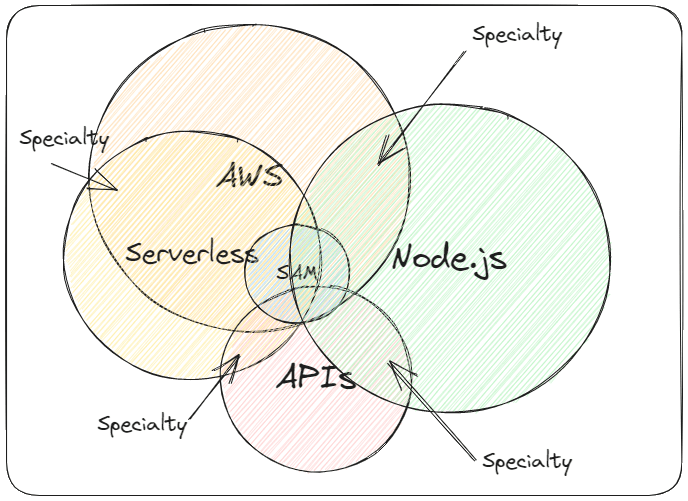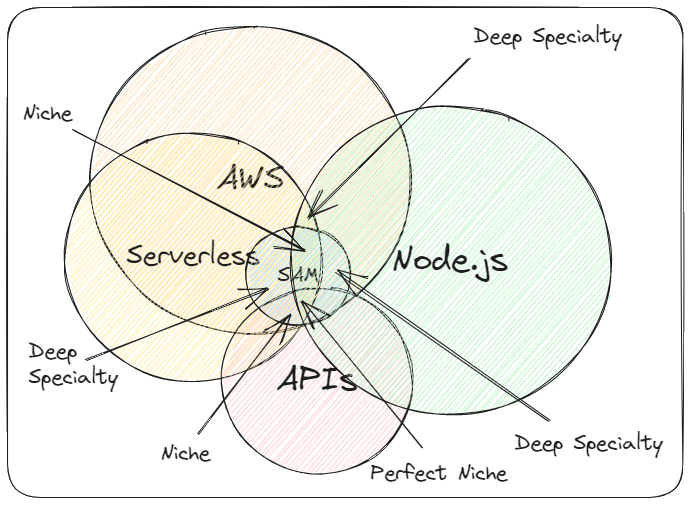I was talking to some of my friends over the weekend about tech. We talked about keeping our skills sharp and staying up-to-date with the latest and greatest. As most of us know, the tech industry moves super fast. New, innovative features and services are introduced weekly, with opportunities to improve our applications and skill sets popping up every day.
My friends were talking about their struggle to keep up. They feel like they've been left behind and that there's almost too much to learn to get from where they are to where they want to be. I asked what they do to practice new skills and their only answer was coding challenges like the advent of code a couple of times a year.
When they asked me how I do it, I responded with a single word: community.
If you follow my content, be it the blog, newsletter, or podcast, you know I talk about the community all the time. But something occurred to me over the weekend as I was talking to my friends. Not everyone knows what the community is, what community they are a part of, and how to engage with it. So let's talk about it and why it's so critical for growing your tech career.
What Is "The Community"?
Simply put - the tech community consists of people who share a common interest in technology and are motivated by the spirit of collaboration, continuous education, and innovation.
These individuals share their findings, ponderings, and open-source code with others online, in-person, or both. They take their lessons learned and share them with others to speed up their learning process and get feedback on what they did. It truly is a selfless place where people are genuinely interested in helping others and sharing their experiences.
The community isn't a place that you sign into and are thrust into the middle of. It's people. It takes a little bit of effort to find the folks that match your niche, but certainly not impossible. You unfortunately can't just login to Twitter and magically see all the people that help influence designs in the things you care about.
With that in mind, how do you find the community?
Finding Your Niche
The general tech community is large. There are hundreds, if not thousands, of ways to slice and dice the community into different topics, categories, and levels of expertise. You probably have 4 or 5 specialty areas that make you uniquely you, and luckily for all of us, there are experts in the community in each one of those areas.
To best show how you find your niche in the community, we'll walk through how I found mine.
There are 5 technical areas where I've focused my energy in my career: AWS, serverless, Node.js, APIs, and SAM. Each one of these technical areas has a group of people out there creating content and helping others learn and grow.
If we conceptualize these technical areas as a Venn diagram, we can start to see specialties emerge where there are overlaps.
A specialty is a combination of two or more of your interests. It's one thing to be in the Node.js community. But you unleash an entirely new context and vernacular if you start talking about Node.js inside of AWS.
If you go a bit further into the overlaps, you start to get into your deep specialty, niche, and perfect niche areas. A deep specialty is a group of people that have three interests in common. In my case, I'd have a deep specialty with other members in the community who build apps with AWS serverless services and deploy them with SAM.
Taking it a step further, if four of my technical areas overlap, I have a niche. A small group of individuals who do most of the things that I do. Someone who focuses on serverless APIs in AWS and deploys them with SAM would fall into a niche. We have a lot in common and could bounce ideas off each other quickly and easily, knowing most of our practices are the same.
Finally, you have the perfect niche - the group of people who do things exactly as you do. In my case, Node.js developers who use SAM and focus on building serverless APIs in AWS are my perfect niche. Most things I write or talk about hit home with this group of people and vice versa.
As you can see from the diagram above, the more overlaps you look for, the smaller the group of people - but the closer you will relate to them. Your community is everything. All the technical areas, all the overlaps, all the specialties and all the niches.
It's hard to find people in your perfect niche. Usually you start with your team at work - they usually do exactly the same as you. Then you see if they have someone in their network that does similar practices, so on and so forth.
Keep an eye out for people on social media and blogging platforms that post content in your specialties and niches. When you see someone new, follow them! See who they are connected with and connect with those people as well. Before you know it, you have an entire community of friends who do what you do.
Disclaimer - I made up all the terms above to help describe the different levels of community. Feel free to use them!
Why The Community Is Important
Where do I even start? The tech community is one of the best ways to not only help your career but also make lifelong friends. Finding people that have similar interests is always a great way to build a relationship with someone. Tech is global, so you'll make friends everywhere! When you travel, reach out to the community and see who lives where you're going. Meet up, talk shop (or not), and get a local experience.
Besides the amazing friendships you build, you'll grow as a professional. Many important career skills are improved by interacting, learning, and sharing in public.
Collaborative skills - As you grow in the community, opportunities will come up to collaborate with others outside of your company. Maybe you're writing a blog post or talking on a podcast or building an open-source project together. You'll be working with new personalities and different skill sets than you're used to, which makes you a more well-rounded teammate.
So much learning - Many people in the community enjoy trying out the latest features in new services, be it in AWS, Cloudflare, GCP, heck it doesn't even have to be a cloud provider. They do a side project with it, distill down the main learning points, and share it so you can save time learning the highlights and any tricky points. You can blaze through article after article taking in a book's worth of information in a fraction of the time. This is one of the best ways to stay current with what's available and how would you use it in this fast-paced tech world.
Expert-level help - We all want to help each other. If you have a specific problem you're working through, you can just ask about it on your platform of choice (mine is Twitter) and have answers start rolling in. When I was doing enterprise architecture, I would regularly send a DM to AWS heroes who I knew were experts in areas I was learning about. I always got incredible answers that helped me more than they probably realized. It never hurts to ask!
Networking opportunities - I've already mentioned friendships, but beyond that are the opportunities that arise when you're present in the community. People ask all the time for help with podcasts, speaking engagements, and project work. If you're actively engaged with the community, these opportunities will pop up, giving you a chance to push yourself out of your comfort zone.
Get direct feedback - On the flip side, you can (and should!) contribute to the community. If you've done something new and innovative, share it to help educate others and offer them the opportunity to shortcut their learning process. Give back and share your pros, cons, and lessons learned from your implementation. You'll often get feedback on your approach and usually a handful of questions that make you rethink everything!
Summary
I can't speak highly enough about getting out in public and contributing. Your rate of comprehension goes up, the speed you learn rapidly increases, and the diversity of topics you discover skyrockets.
Don't feel obligated to give back! You shouldn't feel like you are required to write blog posts or make YouTube videos. It's perfectly ok to be a lurker and learn from others.
The beautiful thing about the community is that it's as large or small as you make it. Find your areas of expertise - they each have their own communities around them. You can get as specific as you want too, there are always going to be people out there that do things the same way you do it. The tighter the niche, the smaller the community - but they often have more relatable lessons.
Be a part of what you're comfortable with, remember you're all there to share and help make the lives easier of like-minded individuals.
Happy coding!





















